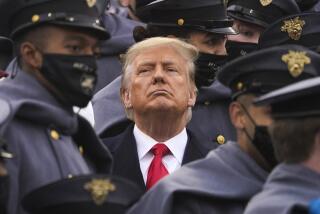Yugoslavia May Use Army to Keep Order
- Share via
BELGRADE, Yugoslavia — Premier Branko Mikulic, facing widespread strikes and rising political dissent, was quoted Sunday as saying the army will be used if necessary to maintain public order and defend Yugoslavia’s Communist political system.
He warned that authorities will use “all means” available against those who would try to overthrow Yugoslavia’s constitutional system.
It was the first direct public comment by Mikulic on the wave of industrial unrest. He has been out of the public eye for a week.
He made the statement in an interview, rarely granted to the foreign press, with West German reporters ahead of a visit he is scheduled to make to Bonn on Thursday. The interview was published Sunday by the official Yugoslav news agency Tanjug.
“If these people (strikers and critics) would organize to overthrow the constitutional system in our country, then we would do the same thing you would do if the constitutional system in your country was threatened,” he was quoted as saying.
Defend System ‘With All Means’
“There should be no doubt in the country or abroad that we shall defend our system with all means.
“It is written in our constitution. We cannot accept any dialogue on whether Yugoslavia will remain a federative country or not.”
Asked whether all means included the army, Mikulic replied: “I have said, all means, and that includes the army, too. Nobody should have any illusions about it.”
An unprecedented wave of strikes swept Yugoslavia this month in protest against a wages freeze Mikulic imposed on Feb. 27.
Under the freeze, the government ordered pay to be rolled back to the average levels of the last quarter of 1986 and pegged future wage increases to increases in productivity.
The government has reported 70 strikes around the country involving thousands of workers. But industry sources say there were more.
First Spontaneous Action
The strikes represent the first time Yugoslav workers have tried by spontaneous industrial action to force the government to change a policy or law. Ministers insist the government will stand firm.
Mikulic said there were people in Yugoslavia questioning the role of the ruling League of Communists (Communist Party).
“They want to push the League of Communists completely from the political scene. But that’s an illusion,” he said.
Mikulic’s first reaction to the strikes came last Friday when the government unveiled a partial three-month price freeze, rolling back many prices to Dec. 31 levels, but he still did not make a public appearance.
The price freeze was at first seen by local political analysts partly as a gesture to calm industrial unrest.
Minimal Effect of Freeze
But Western economists say the price freeze will actually have a minimal effect when applied. They also said the wage freeze that triggered the strikes had yet to take effect in many businesses and that more strikes are likely.
In recent months, Communist authorities have deplored several flare-ups of political dissent attacking established procedure and urging a pluralistic party system.
Western diplomats say that more expressions of dissent in Yugoslavia have been coming from groups, where dissent had previously been identified with individuals.
Dissent has also become more broadly based in character. It had been essentially nationalistic in what is a delicately balanced, multi-ethnic Communist state.
There have been signs of the emergence for the first time of an all-Yugoslav opposition platform, focusing criticism on failures of the government to solve the economic crisis and questioning the system itself.
So far, diplomats said, there have been no signs of political dissenters linking up with discontented workers against the government.
More to Read
Sign up for Essential California
The most important California stories and recommendations in your inbox every morning.
You may occasionally receive promotional content from the Los Angeles Times.












